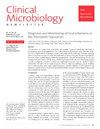鼠形Kytococcus schroeteri致化脓性心包炎1例并文献复习
Q3 Medicine
引用次数: 0
摘要
棘球球菌是一种革兰氏阳性球菌,被认为是人体皮肤的腐生菌,可引起严重感染。由于非特异性临床表现根据宿主的免疫状态和有无植入式装置而变化,诊断很困难。这种病原体似乎有可能对多种抗生素产生耐药性,这只会加剧治疗它的挑战。我们报告一例罕见的施氏克雷氏化脓性心包炎病例,该病例发生于一名40岁的女性,她为接受左乳房肿瘤化疗而行手术植入可植入导管腔,并伴有心包积液需要紧急引流。基质辅助激光解吸-飞行时间质谱(MALDI-TOF MS)的微生物鉴定表明,在心包积液的好氧富集培养基的传代培养中,只存在薛氏K. schroeteri。根据抗菌药物敏感性测试结果及时开始抗生素治疗,导致临床和生物学改善,以炎症指标正常化为标志。该病例揭示了一种新出现的微生物病原体,它有可能影响多种组织,使重要的预后处于危险之中,并强调需要加强临床怀疑,并对免疫功能低下的患者采取适应的治疗方法。本文章由计算机程序翻译,如有差异,请以英文原文为准。
Purulent pericarditis caused by Kytococcus schroeteri: Case report and literature review
Kytococcus schroeteri is a Gram-positive Cocci, considered a saprophyte of human skin, which can cause severe infections. Diagnosis is difficult due to non-specific clinical manifestations that vary according to the host's immune status and the presence or absence of implantable devices. It appears that this pathogen has the potential to acquire resistance to multiple antibiotic classes, which only exacerbates the challenge of curing it. We report a rare case of K. schroeteri purulent pericarditis in a 40-year-old woman who underwent surgery to implant an implantable catheter chamber in order to receive chemotherapy for her left breast tumor, associated with a pericardial effusion requiring emergency drainage. Microbiological identification by matrix-assisted laser desorption-time-of-flight mass spectrometry (MALDI-TOF MS) demonstrated the exclusive presence of K. schroeteri from the subculture of the aerobic enrichment broth of the pericardial fluid. Prompt initiation of antibiotic therapy adapted to the results of the antimicrobial susceptibility testing led to clinical and biological improvement, marked by normalization of inflammatory indicators. This case sheds light on an emerging microbiological pathogen with the potential to affect a variety of tissues, putting the vital prognosis at risk, and underlines the need for heightened clinical suspicion and an adapted therapeutic approach in immunocompromised patients.
求助全文
通过发布文献求助,成功后即可免费获取论文全文。
去求助
来源期刊

Clinical Microbiology Newsletter
Medicine-Infectious Diseases
CiteScore
2.20
自引率
0.00%
发文量
35
审稿时长
53 days
期刊介绍:
Highly respected for its ability to keep pace with advances in this fast moving field, Clinical Microbiology Newsletter has quickly become a “benchmark” for anyone in the lab. Twice a month the newsletter reports on changes that affect your work, ranging from articles on new diagnostic techniques, to surveys of how readers handle blood cultures, to editorials questioning common procedures and suggesting new ones.
 求助内容:
求助内容: 应助结果提醒方式:
应助结果提醒方式:


